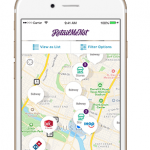Yea, I’ll admit it. There may have been a time when my credit card debt was pretty bad… like I’d use the bills as coffee cup coasters and pretend they didn’t exist bad. But then I met and married a financially responsible guy who helped me make a budget (gah! spreadsheets!) and stick to it. Now I’m writing this post with a great credit rating and a zero balance on my cards.
Along this journey I learned a thing or two about credit; things that can help you too if yours is less than stellar. So if you’re ready to get real about your finances, and do what it takes to get your credit back on track, then read on for some money saving tips. Take it from a former broke girl – you can do this!
Money Saving Tips
Most families are on a pretty tight budget. When it comes to saving money, there is one score that counts. And no… it’s not the score of the playoff game, sorry honey, it’s your credit score. It affects your interest rate every time you borrow money: whether it’s to lease or buy a car, get a credit card, take out a mortgage, whatever. It can even impact whether or not you can rent an apartment or qualify for a particular job. It’s that big of a deal!
The higher your credit score, the lower the interest rates you qualify for, which ends up saving you a lot of money over time. Something this big you’d think everyone would be on top of it, right? But let me ask you…do you even know what your credit score is? When was the last time you looked at a copy of your credit report?
If you’re hearing crickets chirping in your head right now, girlfriend we have some work to do! One of the first steps to getting your financial house in order, and saving money by getting the lowest possible rates, is having a good credit score. Periodically checking your credit report is also a good way to catch identity theft before your good name gets trashed by thieves.
Some credit card companies allow you to check your score monthly for free. If yours offers this service – take it! You can also get a free annual copy of your credit report online from www.annualcreditreport.com .
If your credit score is over 700, then do a little victory dance because you’re doing great! But if your score is lower, then follow these easy steps to raise it and take advantage of better rates.
Fix Errors
Mistakes happen! Even on your credit report. According to the FTC, one in four Americans found one potentially significant error on theirs. Ignore the mistake, or pay a collection item that doesn’t belong to you, and those errors can ding your score for up to seven years from the original bill date. That’s no joke!
“I saw a collection item from a dentist that I had never even heard of! If I hadn’t looked at my report, I wouldn’t have known it was on there.” Cheryl S.
For any collection item mistake, like a medical bill that doesn’t belong to you, start by contacting the office directly to dispute the charge. Billing may be able to resolve the error and drop the claim. If it’s a credit card or loan payment error, contact the bank or credit company. Dealing directly with the entity reporting the error is the easiest way to get it removed.
If talking to the merchant or bank doesn’t resolve the issue, you can also file a dispute directly with the credit bureaus themselves. Keep in mind, you may need to contact all three credit bureaus (Experian, Equifax, and Transunion) to dispute the item on all your reports. Check out the FTC’s website for complete details.
Once any errors are removed from your credit report, you’ll be surprised at how quickly your score can jump back up. It will make the effort worth it!

Pay Down Card Balances
It’s time to pull those credit card bills out from wherever you hide them. Denial is no way to live! Here’s where the dreaded spreadsheet comes in…or notebook, or phone app, or whatever you want to use to track your debt. You can’t tame the beast unless you can see what you’re working with.
List all of your cards, the total balance, the minimum payment and the interest rate. It’s okay to feel a little freaked out by the process, I know I did. But once everything is out in the open and accounted for, I want you to breathe a big sigh of relief. Now you can make a plan and do something about it!
If you’re currently paying the minimum on your accounts, keep doing that. But I want you to pick one card with a smallish balance, but a higher interest rate (department store cards, I’m looking at you). Commit to paying more than the minimum on this one card every chance you get.
Cut back on that latte, roll your loose change, whatever it takes. Any extra cash you have on hand at the end of the week is an extra payment on that card until the balance is paid off. Then, move onto the card with the next lowest balance. By tackling your cards one at a time you will see tangible results faster, which is motivation to keep going.
Each time you clear a debt, your credit score will get a bump up. Resist the urge to cancel the card once it’s paid off though. Try locking it up in a drawer or something, out of arm’s reach so you won’t be tempted to use it.
Here’s why; Each card adds to your overall credit limit. You want to keep your limit high so your spending ratio stays low. This improves your score even more. So keep the cards you have, and avoid any offers to open new ones.
Use Your Credit Cards – Wisely
This may seem counter-intuitive, since I just told you to pay off your card balances. But in order to maintain a good credit score you have to show you can use credit wisely. If you pay with cash, you won’t build a credit history. The bureaus want to know you can use credit and pay it off responsibly.
To demonstrate this, you’ve got to use your cards. But be smart about how you use them. Once you’ve paid off your outstanding balances, choose a card or two that won’t charge interest if you pay your balance in full each month. Also look for cards that offer additional rewards; such as cash back, or airline miles.
These are the cards you want to use to make everyday purchases. The trick is to PAY THEM OFF each month to avoid interest and to use only a small portion of your overall credit limit.
For instance, if my credit limit is $10,000, I wouldn’t spend more than $2,500 each month on that card. A low spending rate has a big affect on the algorithm that determines your credit score. Bureaus can see that you don’t “need” all your credit to get by. They’ll also see you can pay off your bill each month.
Finally, you just need to be patient. Keep paying extra on at least one card and tracking your balances monthly until you pay them off. Then use your cards wisely going forward to build a strong credit history.
You won’t see your score change overnight, but it will climb slowly until one day you find yourself doing the over 700 credit score dance. Which, take it from me, is a great feeling.
Looking for more money saving tips? Check out our favorite Money Saving Apps in Our Picks.












